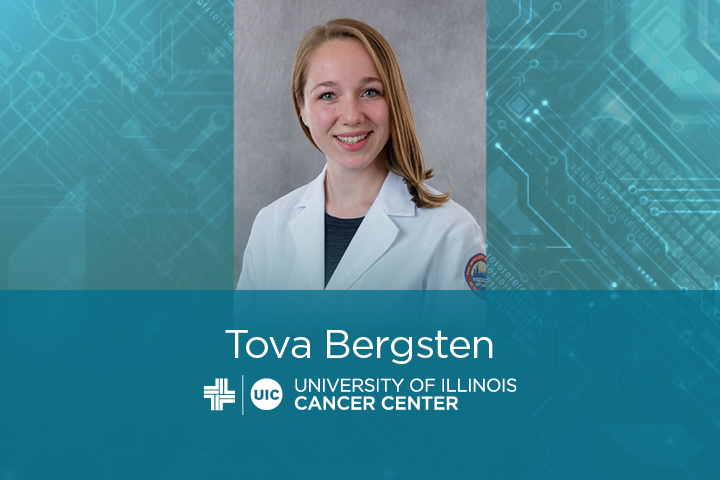
Tova Bergsten had a difficult decision to make. Did she want to spend her career as a scientist to help find a cure for cancer? Or did she want to become a physician to treat patients and help them overcome the potentially deadly disease? After much contemplation, Bergsten thought, “Why not do both?”
Bergsten, a student in the University of Illinois Chicago’s Medical Scientist Training Program (MSTP), has received a Ruth L. Kirschstein National Research Service F30 award from the National Cancer Institute to investigate the chemical signaling involved in the primary metastasis of high grade serous ovarian cancer (HGSOC), the most deadly form of ovarian cancer. The grant supports the integrated research and clinical training of promising predoctoral students planning careers as physician-scientists who are enrolled in a dual-doctoral degree training program.
Studies have shown that HGSOC originates in the fallopian tube from precursor cells – cells which have transformed to the point where they can cause cancer. The precursor cells can travel to the ovary to form tumors, Bergsten said. Under the tutelage of University of Illinois Cancer Center member Joanna Burdette, PhD, professor of Pharmaceutical Sciences and associate dean of the UIC College of Pharmacy’s Research and Graduate Programs, Bergsten is researching HGSOC by using imaging mass spectrometry, a method that takes pictures of ovaries and the precursor cells to identify the signals that promote the movement of the precursor cells toward the ovary.
Two years ago, just prior to Bergsten becoming a member, Burdette’s laboratory identified the molecule norepinephrine – a stress hormone – as a potential signal that causes precursor cells to become invasive and aggressive. To capitalize on its initial findings, Burdette’s laboratory is studying whether blocking norepinephrine signaling can prevent tumor development in animal models.
“We found this interesting because there is already a class of drugs on the market – beta-blockers – that treat heart disease by blocking norepinephrine,” Bergsten said. “If we can find that blocking norepinephrine affects the development of high grade serous ovarian cancer, we may be able to quickly repurpose these approved drugs into a cancer prevention therapy.”
Science was a prevalent topic between Bergsten and her parents, who were both in the healthcare field – her father treating animals as a veterinarian and her mother treating humans as an occupational therapy assistant. During her senior year at Princeton University, Bergsten, a chemistry major, enrolled in a virology course and “was absolutely fascinated, which gave me pause. I wasn’t sure if I wanted to pursue a PhD in chemistry or explore this newfound interest.”
Following graduation, Bergsten worked at a pharmaceutical company, a business that combined her interests in medical science and therapies. She then became a research assistant on a clinical trial at a Veterans Administration hospital in New York. Working with patients and the medical staff on a daily basis affirmed Bergsten’s desire to pursue both medicine and medical research.
Bergsten initially planned to conduct research in the immunology field when she enrolled in UIC’s MD/PhD program. Her mind changed after a lecture that encouraged first year students to choose laboratories based on the quality of science and mentorship. Biological research was new to her, but Bergsten felt a connection to Burdette’s lab. There, she’s learned the fundamentals of cancer and how to design biological experiments and mentor younger students.
“I love teaching as much as I love medicine,” said Bergsten, a native of suburban Lombard, Illinois, who is expected to graduate from UIC in 2025. “My ideal atmosphere would be one similar to that of an academic hospital, where I can place an emphasis on educating both medical trainees and patients while conducting meaningful translational research.”
